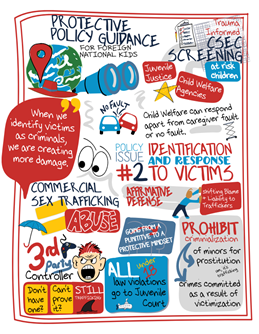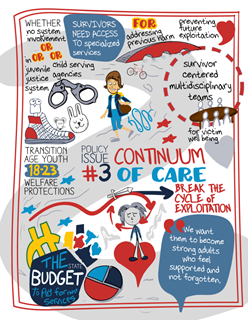Shared Hope International is grateful to Congressmembers Smith and Bass for introducing the Frederick Douglass Trafficking Victims Prevention and Protection Reauthorization Act of 2021, and for their longstanding commitment to combatting human trafficking and promoting trauma-informed responses to trafficking survivors. This critical legislation reflects that commitment by highlighting the importance of prevention through education, training and research as well as appropriate accountability for offenders, while also advancing trauma-informed approaches that better meet the needs of trafficking survivors. Additionally, by furthering efforts to reduce vulnerabilities to trafficking and build resiliency factors by improving access to mental health services and housing, this legislation takes important steps toward preventing survivors from returning to exploitative situations. And by encouraging consistent trafficking definitions at the state level to increase identification of child sex trafficking survivors and improve their access to resources, this legislation will also prevent child victims from falling through the cracks of systems designed to assist them.
As Shared Hope International has seen over the past 23 years, human trafficking is a complex problem that requires long-term solutions; by extending authorizations until 2026 to create greater continuity for human trafficking programs and enforcement efforts and by ensuring that trafficking survivors voices continue to be at the forefront through the Advisory Council on Human Trafficking, this legislation truly takes the long view. Shared Hope is pleased to support the Frederick Douglass Trafficking Victims Prevention and Protection Reauthorization Act of 2021 as it creates needed infrastructure for improving responses to trafficking survivors while advancing effective approaches to ultimately prevent the egregious harms that trafficking survivors should ideally never have to experience in the first place.
Please take a minute to contact your Members of Congress, urging them to pass this vital bill.


 Issue area #3, Continuum of Care, addresses the need of more services for victims of child and youth sex trafficking and vulnerable populations.
Issue area #3, Continuum of Care, addresses the need of more services for victims of child and youth sex trafficking and vulnerable populations. The meeting went well with fifteen people in attendance. We only had a short time, so we made envelopes of Shared Hope International info for each of the 6 board members, the District Admin. and the new JR/HS Principal. This seemed to work well and they appreciated the ability to look over examples of what SHI has for resources. We also had our display poster board as an example titled “It is happening here” to help dispel the myth that we are isolated from DMST. The meeting went well and we were able to engage the school board to consider working HT into this coming year’s curriculum. We were quickly able to reference our flexibility to meet the need for awareness and prevention for students, staff, as well as parents.
The meeting went well with fifteen people in attendance. We only had a short time, so we made envelopes of Shared Hope International info for each of the 6 board members, the District Admin. and the new JR/HS Principal. This seemed to work well and they appreciated the ability to look over examples of what SHI has for resources. We also had our display poster board as an example titled “It is happening here” to help dispel the myth that we are isolated from DMST. The meeting went well and we were able to engage the school board to consider working HT into this coming year’s curriculum. We were quickly able to reference our flexibility to meet the need for awareness and prevention for students, staff, as well as parents.





